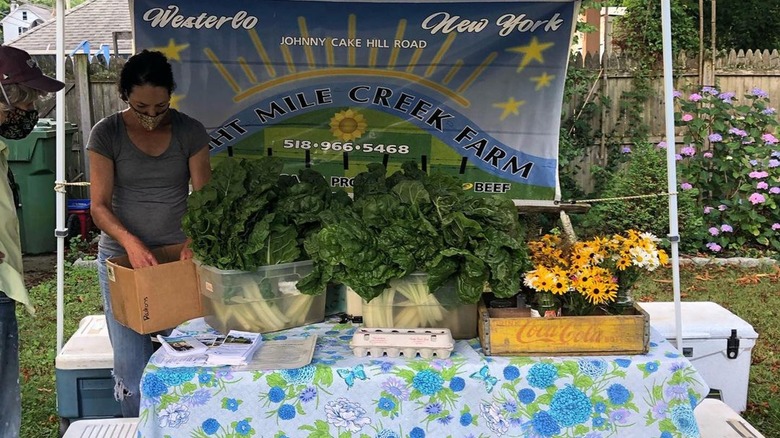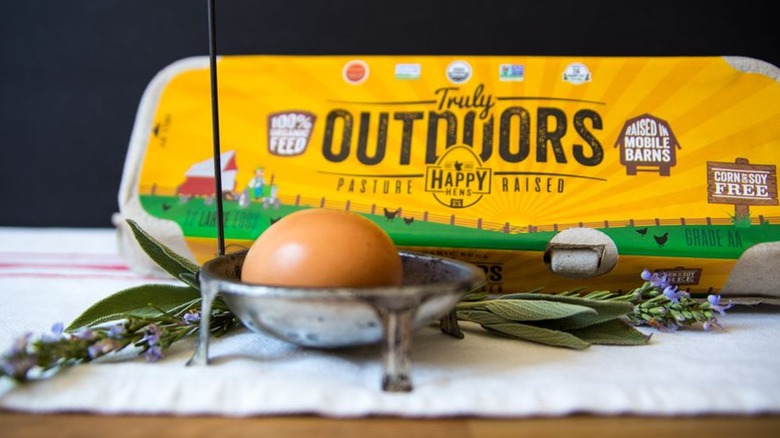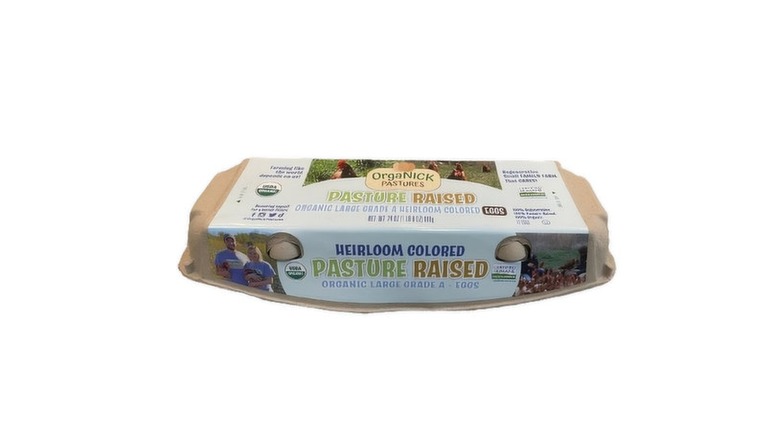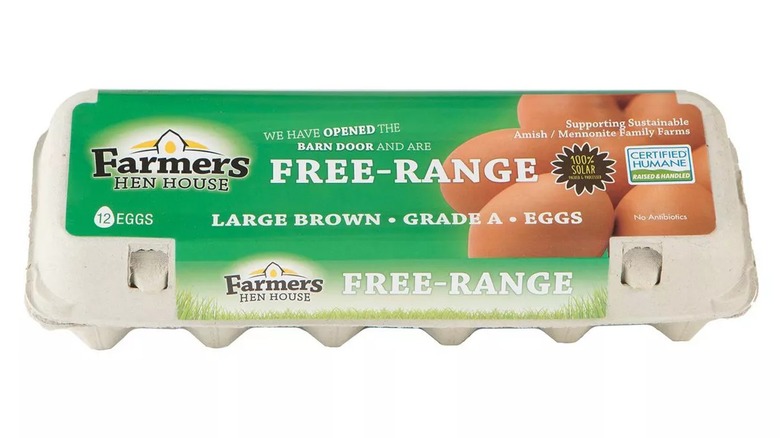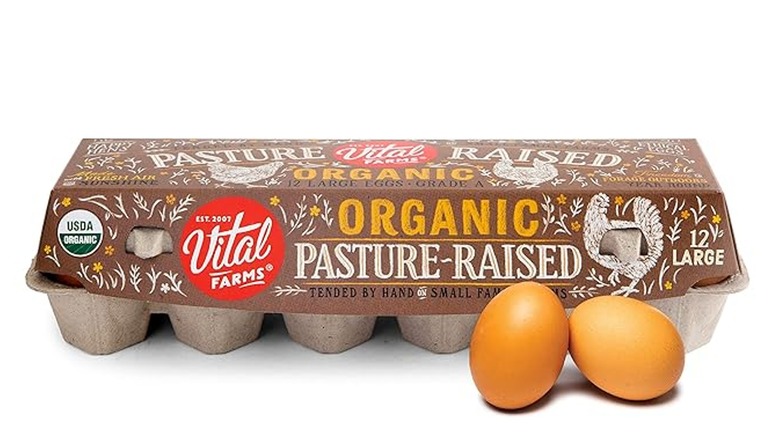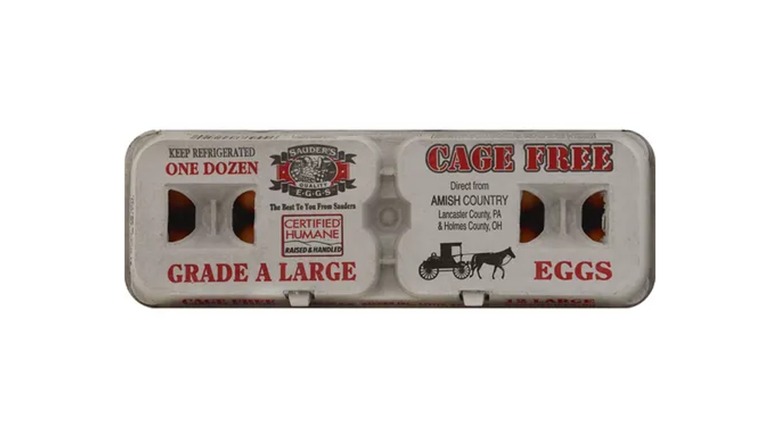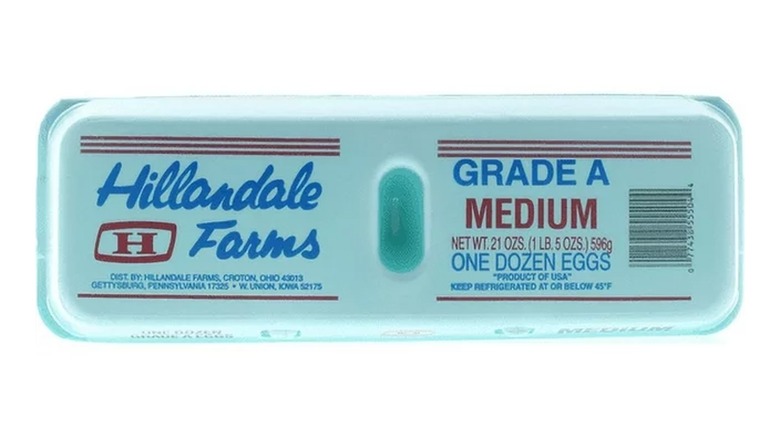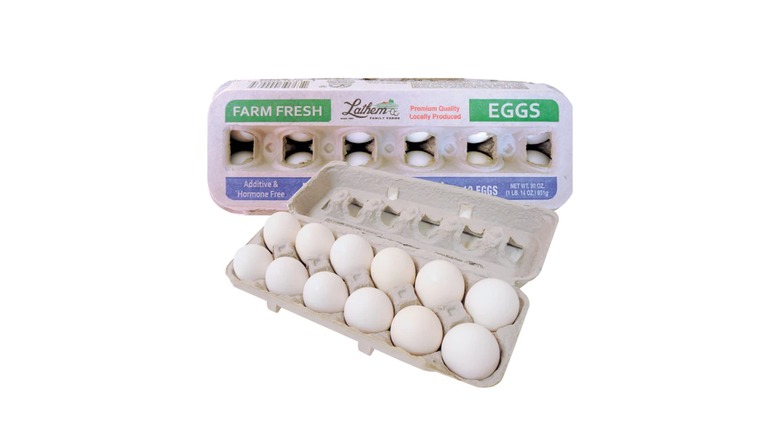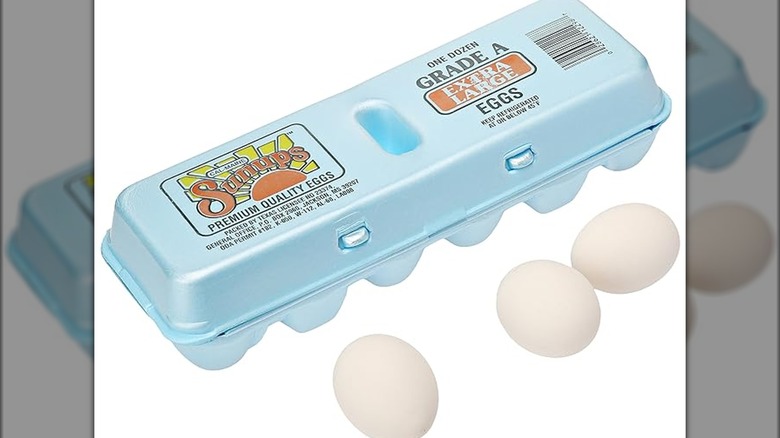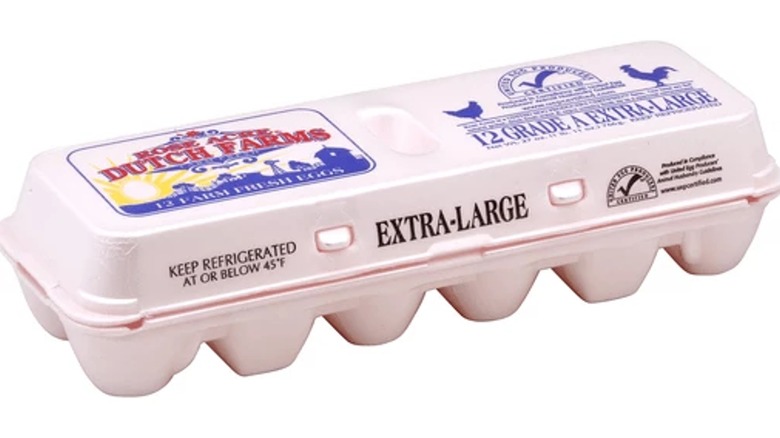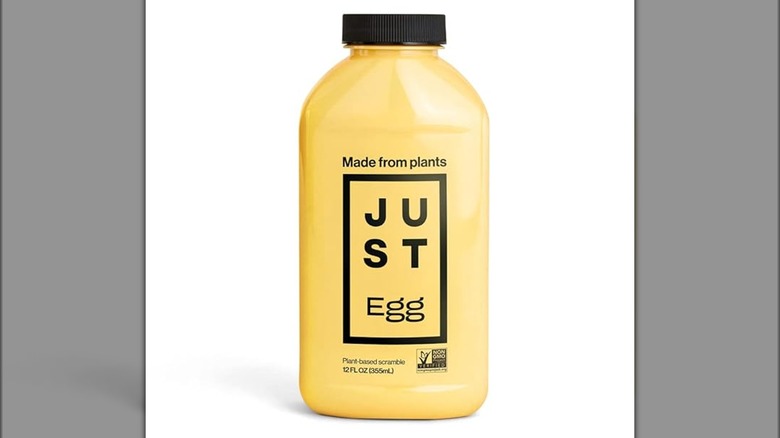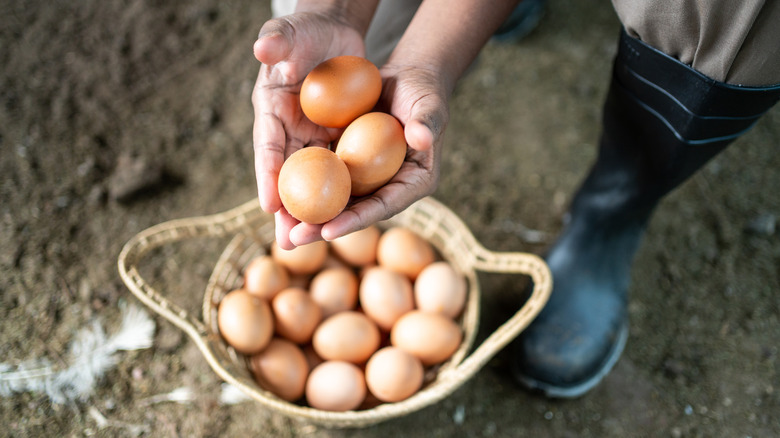6 Best And 5 Worst Egg Brands To Buy
We may receive a commission on purchases made from links.
Eggs have been a kitchen staple for a long time, even for those of us who aren't fortunate enough to have a flock of birds in our backyard. One of the many great things about eggs is that they're readily available. But, with that availability comes some surprising complications. There are approximately a million and one different choices to make (we counted) when reaching for a container of eggs, and they're not all straightforward. There are a lot of surprising egg facts that can complicate things even further. So, do you opt for cage-free? Free-range? What do cage-free and free-range mean, anyway? Organic? Grade A?
Let's talk about that last one to help illustrate just what would-be responsible egg buyers are up against. The idea of Grade A eggs sounds great, right? Surely, they're the best? But it's not so easy. While Grade A is a description of the eggs' qualities, there's a pretty good chance that a carton full of very similar, Grade A eggs came from chickens that were condemned to spend their short, painful lives in a factory farm. And there are still a lot of eggs produced under incredibly cruel conditions — up to 66%, according to various estimates.
That's clearly not great, especially if you're trying to make better choices at the grocery store. So, what eggs should you really be buying — and which brands in particular? Let's talk about what brands of eggs you can hope to buy with a clear conscience, and some that you should just walk away from. Read to the end for a full explanation of our methodology.
Best: Eight Mile Creek Farm
The Cornucopia Institute is one of the country's biggest watchdog groups that monitors organic products and companies. When it comes to the organic egg scorecard established by the Cornucopia Institute, New York's Eight Mile Creek Farm is the company to beat. The small-scale farm scores major points across the board, particularly in the care of hens. Its birds are kept in small flocks, have access to indoor and outdoor spaces, and alterations like beak trimming don't happen. There's no space-per-hen number given because that's just not how the farm works.
The family-owned farm has also gotten high marks for its other organic products, including vegetables, pork, chicken, and beef. Eight Mile Creek Farms sells eggs and produce with a CSA share subscription. All of the farm's chickens reportedly live to the end of their full, natural lives, with fewer than 2% of the flock dying prematurely.
Let's put it this way: The Cornucopia Institute's total possible score is 1800, and Eight Mile Creek Farms scores 1795.
Best: Happy Hens
Customers can find eggs from this small-scale, California-based farm in stores across Orange County and San Diego, and that limited availability is kind of exactly why we like it. The idea that small, family-owned farms that are responsibly raising chickens can sell their eggs in a local area is exactly what we'd love to see happening across the country — and Happy Hens has the blueprint for it.
The company is lauded for purchasing organic feed from local suppliers, its relatively small flock sizes, and its unique coop setup. Its flocks live in mobile coops that are moved every few days to allow the birds access to fresh pasture. Vulnerable chickens are protected by dogs and a donkey. Owner Chloe Nevarez explained to The Cornucopia Institute that outside chickens are happy chickens: "You can see it in the way they look and observe the difference in their psyche. It's remarkable — outdoors is better."
Reviewers on Yelp rave about the eggs, with one saying, "They have the freshest eggs, which is why we don't go anywhere else ... Once you have Happy Hens, you never go back." Another said "You see the difference cause size and color are so very unlike all nice looking store bought eggs ... since eggs are so fresh, you can eat them raw!"
Best: OrgaNick Pastures
OrgaNick Pastures is based in Wisconsin, but the company is large enough that it can ship its eggs nationwide. Customers in the midwest will probably be the most familiar with this brand, as it's a staple at the Sprouts grocery chain. That's also where it's given a solid, 4.5/5-star rating by customers, which is nothing to sneeze at!
OrgaNick is also highly rated by The Cornucopia Institute, which confirms that the brand's organic label is legit. Chickens have access to outdoor space, and the organic farm is also certified for humane care and doesn't use GMO feed.
All of the eggs come from two family-owned farms in Wisconsin that were built and designed to produce responsibly sourced eggs. The entire operation is owned by Nick and Holly Westby. The farm's hens lay brown and cream-colored eggs, but there are also blue and green in the mix, too!
Best: Farmers Hen House
Getting a group of people to agree on anything is a bit like herding cats, only more of a challenge. So, it's super impressive that Target's reviews of Farmers Hen House eggs currently consist of 92% 5-star ratings, with customers loving them pretty unconditionally. "This is the original 'organic' and they are the nicest humble people you will ever meet," says one. "These are excellent eggs, always fresh," says another, while a third states that "These taste just like the eggs we buy from the farm."
Customers also love the fact that the eggs come packaged in a biodegradable container. The brand also has a fascinating set-up in place for getting its eggs: to keep small-scale family farming sustainable, the company sources eggs from mostly Amish and Mennonite farms. In just a 6-mile radius, it contracts with more than 100 family-owned farms that still practice sustainable farming methods passed down through generations.
Hens are raised with protected access to the outdoors, they're certified humane, and the company gets kudos for transparency. In addition to Target, Farmers Hen House eggs can be found nationwide at a variety of grocery stores, including Sprouts.
Best: Vital Farms
As of this writing, the Organic Pasture Raised Eggs from Vital Farms have nearly 14,200 ratings on Amazon, while sitting at a respectable 4.8 out of 5 stars. Some reviewers have even taken issue with the complaints, with one — who raves, "My Favorite Eggs!!! :)" — pointing out that, of course, there are differences in the colors and size of individual eggs: "c'mon people... do you think eggs are one-size-fits-all and the farmer gets to fire chickens that don't make perfect eggs?"
They're correct. When a container has all nearly identical eggs — often all labeled as Grade A — it's a sure sign that chickens were raised in a factory farm setting. Vital Farms, meanwhile, focuses on what it calls restorative eggs, meaning chickens are raised on farms dedicated to rotating cover crops and a variety of plant and animal life meant to keep soil and local water systems healthy.
The Cornucopia Institute also gives high marks for the eggs' packaging, which is made in part from the fibers of those responsibly-rotated cover crops. Since Vital Farms is available via Amazon and in stores nationwide, it presents a great option for a more responsible egg.
Best: Sauder's
One of the biggest hurdles in sourcing responsibly-raised eggs from small-scale farms is accessibility. Everyone would love to have a mom-and-pop farm down the street, but that's just not how things work for many of us. Fortunately, there are some good, widely available options out there, including Sauder's Eggs. They're found nationwide and in stores like Sam's Club, where they have a solid 4.7/5-star rating. Among the biggest complaints were price increases, but let's face it — aren't prices going up everywhere?
Sauder's has been around since the 1930s. Today, it barcodes its eggs. Enter that code into the website, and it'll direct you to the farm that the egg came from. Cool, right?
While The Cornucopia Institute gives this company a score that isn't nearly as high as other smaller-scale farmers, that's understandable as a trade-off for accessibility. But there are still some things that set Sauder's apart. Chickens are given access to outdoor areas — not a token patch of grass that some companies use to claim they sell pasture-raised eggs without really putting in the legwork. Contracted farms are inspected on an annual basis, and the eggs are certified humane.
Worst: Hillandale
Hillandale Farms sells eggs under both Hillandale and Eggland's Best, so while Eggland's Best is widely lauded for the eggs' nutritional value, there's a whole slew of problems that just can't be overlooked. That includes a 2015 expose by the Humane Society, which released an undercover video that exposed brutal farm conditions including cramped chickens in dirty cages, side-by-side with dead and rotting birds. In a statement to ABC News, Hillandale said that wasn't the norm, and that it was investigating the facility the video came from. (Hillandale was later cleared of all animal abuse charges.)
That hasn't been the only problem, though. Hillandale has also been connected to several massive egg recalls, after thousands grew sick with salmonella. The 2010 outbreak was hardly surprising: Hillandale head Jack DeCoster had already been handed millions of dollars in fines for repeat health violations. That was the same year DeCoster admitted to multiple counts of animal cruelty.
We're not done yet. In 2020, New York state went after Hillandale for price gouging during the COVID-19 pandemic. As a result of the company's actions, egg prices quadrupled in some places. To settle the suit, the company agreed to send 1.2 million eggs to New York food banks, shelters, and soup kitchens.
Worst: Lathem Family Farms
Lathem Family Farms eggs can be found in stores like Trader Joe's, Royal, and Harveys, but those cartons carry an uncomfortable history. In 2016, David Lathem protested the cage-free initiatives meant to create a more humane life for millions of egg-laying chickens. Even though the roll-out was to take place over at least a decade, he condemned the standards as chaotic and impossible.
Lathem Family Farms has also been on the receiving end of some pretty gross warnings from the FDA. In a 2023 citation, FDA inspectors outlined major issues discovered at both poultry farms and processing facilities. It's worth noting that these official letters come after companies have been given adequate time to fix problems.
The letter revealed the company was found to have "a resident strain of Salmonella Enteritidis in its poultry houses and within its processing facility environment." In addition, the company apparently had no procedures in place to control salmonella strains, growths, and outbreaks. Stray animals — including cats and foxes — were found living among the chickens, which were themselves living in improperly cleaned cages with manure. Pests such as flies and rodents were found in the chicken feed.
Worst: Cal-Maine
What do General Mills, Kellogg, Kraft, and Nestle have in common? They all got together to file a price-fixing lawsuit against Cal-Maine Foods, claiming that the company had violated antitrust laws to inflate egg prices. The initial judgment awarded the four companies $17.7 million, but it was still possible that the fines would end up much higher.
Then, there are the allegations of animal abuse at Cal-Maine farms. In 2018, a video taken during a three-week-long undercover operation at one of its farms in Polk County, Florida documented cockroach-infested chicken cages holding birds that slowly starved to death, and were left rotting alongside living birds. Chickens that escaped their cages were brutally killed by workers. Another investigation at a Texas farm found hens being kept in similar conditions, which is two times too many.
It's perhaps unsurprising to learn that Cal-Maine has been behind major egg recalls for salmonella contamination. In 2010, 288,000 eggs were recalled, some of which were sent to distributors even after salmonella was found in the supply line. That announcement came on the heels of another recall that saw 800,000 eggs pulled from shelves over similar concerns. Add in the fact that Cal-Maine spent more than half a million dollars opposing legislation that would ban battery cages in egg production, and well, that speaks for itself.
Worst: Rose Acre Farms
Rose Acre Farms claims that it's "family-owned with small-town values," includes a Bible verse from Psalms on its main web page, and touts a commitment to quality and care. There are plenty of headlines to suggest otherwise, though. In 2023, it was a part of the price-fixing lawsuit brought and won by General Mills, Kellogg, Kraft, and Nestle.
The company has also been at odds with the Humane Society of the United States, even ending up in court over an alleged pattern of deceptive and false advertising. The complaint claimed that Rose Acre Eggs — sold under brand names like Eggland's Best, Great Eggs, and Christopher Eggs — were advertised as the product of humane and responsible conditions, while HSUS investigations found exactly the opposite. The company was at the center of a salmonella outbreak in 2018, and it was reported that the facility in question had already been dealing with a runaway infestation of rodents.
It's also been one of the companies featured in the undercover videos filmed by Humane Society employees who have worked on farms to shine a light on the unthinkably cruel conditions that hens are kept in. In 2011, The New York Times reported on the outcome of a video filmed at a Rose Acre facility, apparently showing injured, dead, and dying birds, alongside wildly unsanitary conditions. No Rose Acre employee was fired, but the company did overhaul its hiring practices to make it harder for whistleblowers to gain access.
Worst: JUST Egg
With the living conditions of countless egg-laying hens being a major concern, it makes sense that a plant-based alternative would be a really good thing. It turns out that it's not as clear-cut as that, and let's start with nutrition. Are plant-based eggs — and their lower cholesterol — better? Not necessarily: Bonnie Taub-Dix, RDN, says (via Healthline) that old worries about eggs, cholesterol, and heart disease have been largely debunked. On the flip side, plant-based eggs are also missing one of the most important components of real eggs: all that sweet, sweet protein.
Nutritionists over at Illuminate Labs also took a look at JUST Egg on an ingredient level and found that there are some problems. JUST Egg relies on mung bean protein, which doesn't contain all the amino acids we need. What it does contain are added sugars, preservatives, and something called transglutaminase, which can impact food allergies.
In 2023, Wired did a deep dive into the JUST Egg company and found some things that might make some hesitate in reaching for this particular product. At the time, the company was facing a series of lawsuits from a former partner and from vendors who claimed millions in unpaid bills. Also suing? An engineering firm (for $4.2 million in unpaid work), a landlord ($2.6 million in unpaid rent), FedEx ($72,000), and bioreactor firm ABEC (around $100 million for unpaid invoices). That's some food for thought.
Methodology
For egg brands to be considered among the best, we looked for transparency in their practices, as well as humane conditions for their egg-laying hens and dedication to animal welfare. A lack of those humane conditions and the use of practices widely deemed as cruel — including lifelong confinement to battery cages — either shuffled brands over to the worst side or took them off the ranking altogether.
We also looked at patterns of FDA citations, recalls, and repeat links to outbreaks of salmonella and other pathogens. We considered good customer reviews as well.
Perhaps surprisingly, there's one thing that wasn't a dealbreaker either way: Nutrition. Why? In 2021, the CBC extensively tested the nutritional value of 14 different egg brands to see if organic eggs from small farms were more nutritious than factory farm eggs. It found that there were no noteworthy differences in vitamin content between the different eggs. Some organic eggs contained more protein and some vitamins, but the study acknowledged that determining precise numbers was difficult because of differences between birds.

